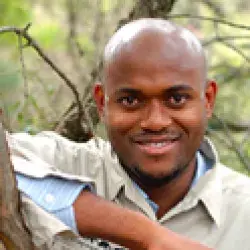Lamentations of the Timbavati Tragedy
Albert Ndlovu, who works on one of the Timbavati properties, poses for a picture with student Lars Sund. Albert assisted AWF with setting up cameras at our Timbavati site while Lars gained valuable field experience.
With this, we are grateful to the Timbavati warden and the land owners for indulging us and allowing us to work in their beautiful land, notwithstanding the brevity of our work there.
We were unable to collar a leopard during April and Jeremy had to leave. He came back again in June and Jeremy, together with Mark Jack-Freeman (a volunteer on the project), Timbavti staff and a representative of the Mpumalanga Tourism and Parks Agency successfully collared a male leopard. At the time I was busy with photographic surveys in Kruger Park and I told Jeremy that I was very jealous because I was not part of the action. I was also very happy that we would soon start collecting valuable data from the collared animal. We were not able to collar another animal as Jeremy had to go back home and take care of his practice.
When Jeremy came back in October 2011, thanks to the help of our donors, we were able to purchase four lion collars and three small collars. The plan was to collar four lions and use the smaller collars on leopards and hyaenas; one leopard and two hyaenas to be specific. The plan seemed to work well when Jeremy managed to collar three lions and one hyaena and when he left we were all on a high because the project was gaining momentum. At that point we were feeling that it was time to hopefully place a PhD student at the study site as a capacity building initiative. We even made arrangements to meet with a professor (a leading large carnivore specialist) from one of the universities in South Africa to identify a suitable candidate. Personally I was running on a high, thinking that we could finally give a positive report to the people who have been supporting us, but alas, I was blissfully unaware of the perfect storm that was brewing around the project.
It turns out that there were a lot of people who were unhappy about the project. Consequently a meeting was held in January and it was decided that the project be halted immediately. AWF was not at the meeting, so I cannot divulge much from it. As such all the cameras were removed from the field. We were given data from all the camera traps that were in the field, for which I am very grateful.

